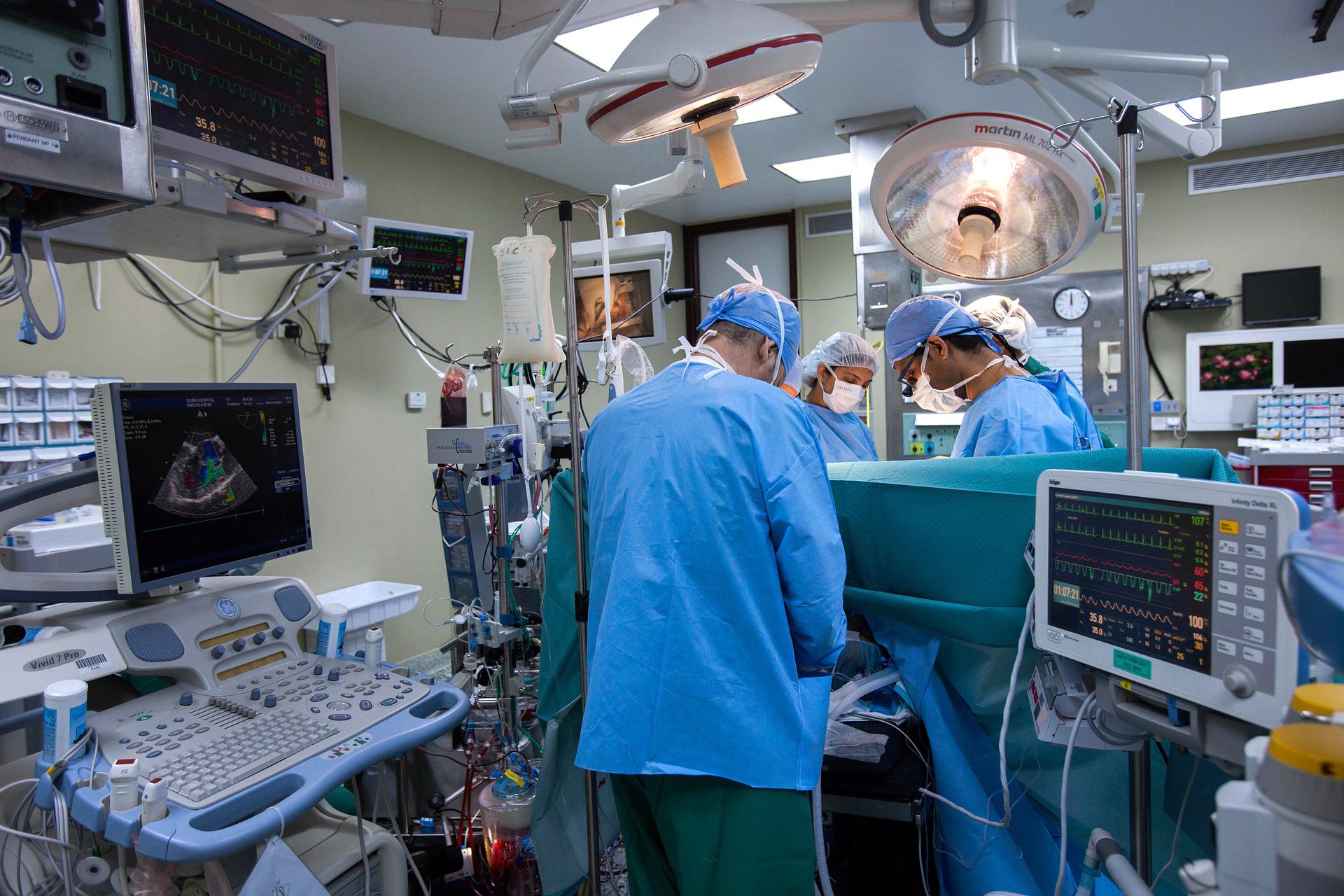.png)

A vascular surgeon is a physician who specializes in the repair and reconstruction of blood vessels. They perform surgeries on patients with vascular diseases, including aortic aneurysms, leg sclerosis, and varicose veins. These surgeons may also perform tests to detect and treat vascular trauma. They also work with other doctors to treat patients with ongoing conditions, answer patient questions, and schedule follow-up visits. Vascular surgeons may also perform procedures to treat spider veins, varicose veins, and leg swelling.
A vascular surgeon will typically refer a patient to undergo a vascular procedure if they suspect the patient has a vascular disease. Patients may be referred to see a vascular surgeon after an unexpected hospital stay, such as for a heart attack or a stroke. Patients may also seek treatment for other conditions if they experience symptoms like leg pain or high blood pressure. A vascular surgeon is highly qualified and trained to diagnose and treat a variety of vascular issues.
Before becoming a vascular surgeon, a physician must first complete medical school. A fellowship program, usually lasting two to years, is required to become a board-certified vascular surgeon. Most fellowship programs have been approved. They may also opt to pursue additional training in cardiac surgery. Finally, a vascular surgeon must pass a board-certified vascular surgeon exam to be eligible for independent practice.
Another type of vascular surgery involves restoring blood flow to damaged areas. For example, a vascular surgeon may perform a bypass surgery to improve blood flow in the foot. In addition, a vascular surgeon may perform an AV shunt on a patient undergoing dialysis. Additionally, a vascular surgeon may perform carotid endarterectomy on a patient with clogged neck arteries to improve blood flow to the brain.
While vascular surgery has many benefits, it can also carry risks. Besides causing complications, it can lead to a blue arm, or leg, as well as blockages downstream from the artery that was treated. Moreover, vascular surgeons to perform complex surgical procedures that can have severe consequences. The best way to avoid complications is to choose a doctor who is well-versed in vascular surgery. There are several reasons to choose a vascular surgeon.
Before undergoing surgery, a vascular surgeon will need to collect information about your health and family history. He or she will also ask about recent tests and diagnostic tests. The patient will then be asked to remove any clothing that may impede the surgeon's access to vital body parts. A vascular surgeon will also need to insert a catheter through a small puncture in the groin or elbow. After taking these precautions, the vascular surgeon will perform an examination to diagnose the condition. After the procedure, he or she may prescribe lifestyle changes or surgery to cure the problem.
Symptoms of vascular disease may occur suddenly, gradually, or infrequently. The symptoms can also be localized and painful, and may affect any part of the body. If the condition is detected early, medications and a regular walking routine may be all that is needed. If symptoms persist, surgery can be done to improve mobility and quality of life. In severe cases, the benefits may outweigh the risks. These procedures are beneficial for patients with severe conditions.

The vascular surgery specialty became a specialty with innovations in technology and a growing cadre of dedicated practitioners. These developments have made it easier for vascular surgeons to perform advanced procedures with less risk to patients. In the early part of this century, the VESS was called Peripheral Vascular Surgery Society, and its annual meeting now features the Vascular Technology Forum. The forum features expert talks and company demonstrations.
A vascular surgeon performs various types of surgical procedures and evaluations to diagnose, treat, and prevent vascular disease. This specialist may perform open and endovascular aortic surgery, endovascular aneurysm repair, or carotid endarterectomy. He may also provide treatments for spider veins, varicose veins, and leg swelling. He may also perform procedures for vascular conditions related to diabetes or heart valve replacement.
The book is divided into sections examining different periods, fields, and individual contributors. Throughout the book, major milestones are acknowledged, including Hallowell's first suture arteriorrhaphy and Parodi's groundbreaking innovation. A new section addresses the dramatic changes in endovascular surgery over the past decade. Because endovascular surgery is relatively new, compiling a history of it is not easy.
A vascular surgeon has a wealth of knowledge, but the field was not established until the 1950s, when William Reid and Kennedy Watt began to practice exclusively in the field. After training in different universities, they later worked as faculty members at Rush Medical College. Both men were instrumental in the birth of cardiothoracic surgery and in the development of artificial grafts. In addition, the two doctors founded the Society for Vascular Surgery in 1947.While the majority of vascular problems can be successfully treated without surgery, some can only be managed through surgery. The risk factors for vascular disease are the same as those for heart disease, and tobacco use, obesity, and sedentary lifestyle are all known to increase the risk of vascular diseases. Other risk factors include age and family history, as well as diabetes and kidney disease. Many vascular surgeons are able to treat vascular conditions without the need for surgery. The procedure can include medicine or lifestyle changes.
Training in vascular surgery was first considered a subspecialty of general surgery, but it has since become its own specialty. Today, there are two paths to training in this specialty: one is a five-year general surgery residency followed by a one to two-year fellowship in vascular surgery. Another option is to opt for additional training in cardiac surgery. Programs vary widely from country to country. Some vascular surgeons also pursue additional cardiac training.
Many vascular problems are associated with pain in the body. While kidney stones are painless, a blockage in the carotid artery can result in a stroke. Some people may not even know they have vascular problems until it becomes severe. But in more advanced cases, symptoms can include fatigue and cramps. If the symptoms are severe enough, they may need to undergo a vascular surgery. These procedures involve a variety of procedures.

A Vascular surgeon's salary varies depending on his or her geographic location. While hospitals in large metropolitan areas and medium-sized cities are often the most desirable places to work, rural settings may not be the best choice for the job. However, if you have the desire to practice in a rural area, you may be able to command a higher salary. In fact, vascular surgeons who live in rural areas can also make a good living.
Among the different types of vascular surgical jobs, a vascular surgeon has the most varied income. The majority of these surgeons earn in private practice, though some are employed in hospitals or other academic facilities. As life expectancy increases, so do the demands for these specialists. It is crucial to learn the details of the various income sources and how they differ. In addition, ask about the income-generating activities involved in hiring surgeons. Make sure to clarify whether a position will allow you to do these activities as well.
If you have a vascular disease, you may benefit from surgery. Lifestyle changes, medication, and exercise can often provide the relief you need. Some vascular surgeons will also recommend lifestyle modifications or watchful waiting for patients with a condition like aneurysm. Carotid artery disease, which is a major cause of stroke, can be treated with endovascular surgery, watchful waiting, or open surgery. A carotid artery endarterectomy is one of the most effective options for the treatment of this condition, but open surgery may be necessary if the disease has progressed to the point of life-threatening internal bleeding.
A vascular surgeon's case volume may vary significantly depending on their experience and training. Endovascular procedures are an integral part of the vascular surgeon's armamentarium, but there are still some institutional turf wars regarding who has the privileges to perform these procedures. To find the ideal vascular job for you, make sure you fully understand the requirements for your specific practice and the practice's culture. If you can find an appropriate setting, you will be able to schedule and perform endovascular procedures.it has a Residency Review Committee that reviews a vascular resident's skills and training. It formed the Vascular Surgery Sub-Board of the College of Medical Specialties. This organization consists of a representative of the vascular community, along with representatives of several major vascular societies. The board's mission is to advise the Board of Surgery on issues related to the specialty. The VSB was created as a result of the combined efforts of the two societies.
Traditionally, vascular trainees are not trained in other skills. The curriculum for vascular training does not include courses on how to interview, assess employment opportunities, or negotiate contracts. Vascular trainees are rarely taught about different practice environments or how to earn income. This is changing. And training a vascular surgeon should be as comprehensive as possible. A good vascular trainee will gain a competitive advantage in the field. When a trainee enters the workforce, they must learn to adapt to this new environment.
Member spotlight
Center for Vascular Medicine - Columbia, MD
8860 COLUMBIA 100 PKWY STE 400B
COLUMBIA,MD 21045
301-486-4690
https://www.cvmus.com/location/columbia
https://g.page/CVM-Columbia-MD?share
A Vein Doctor Near Me can help you find the right treatment for your condition. These professionals perform minimally invasive procedures that can close damaged veins and prevent blood from flowing into them. You'll find these procedures performed by the best vascular surgeons. The treatment itself is painless, and you can resume normal activities immediately afterward. Listed below are the benefits of these procedures.
The Society for Vascular Surgery recently formed a committee to engage with the Department of Veterans Affairs, and its Immediate spearheaded the effort. The purpose of this Vascular Surgery Community Spotlight is to develop a better relationship with the leadership and enhance patient care. This is an excellent opportunity to highlight the contributions of vascular surgeons to the VA and to engage with other organizations to make the healthcare system better for patients.